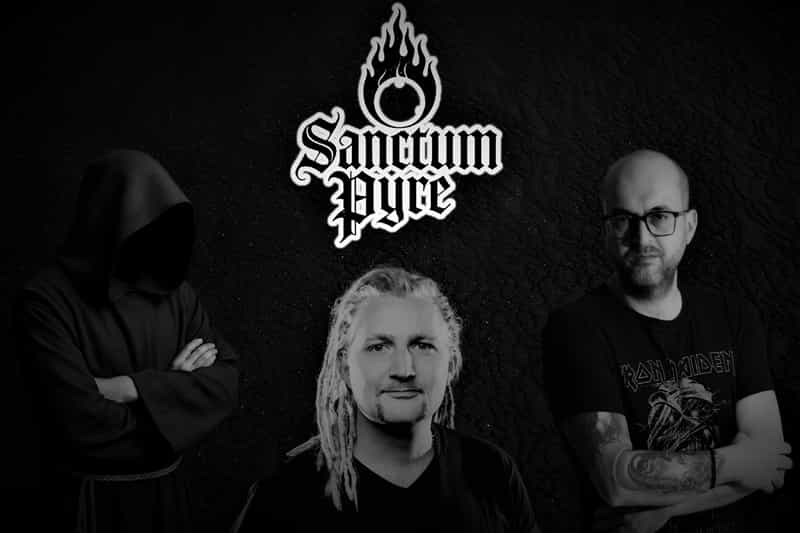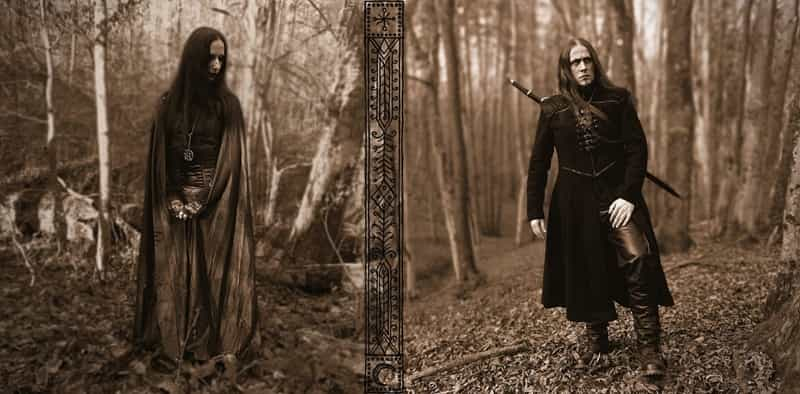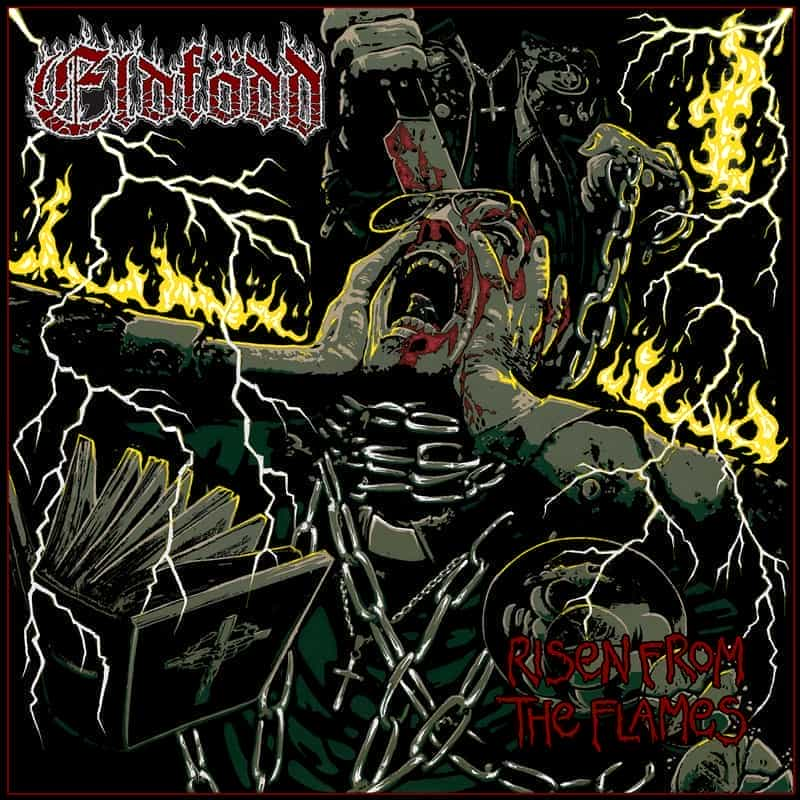#Interview: Artem (Voragoth)
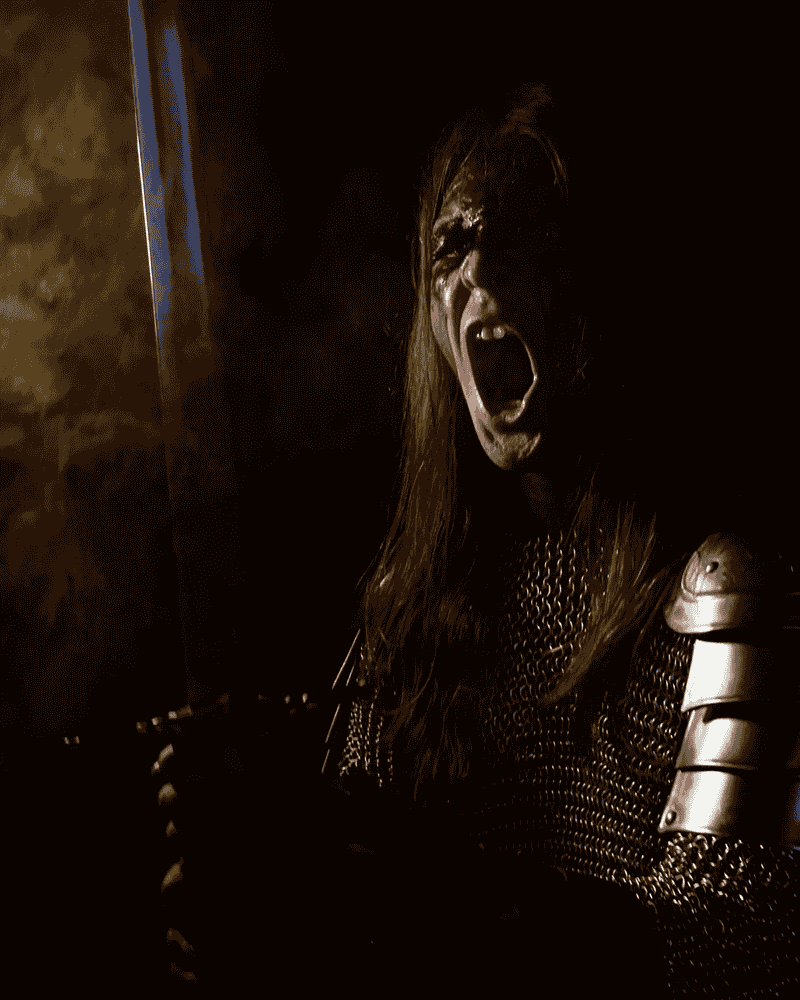
#Interview: Artem (Voragoth) by Sílvia
Maybe you have listened to the one man band from Croatia named Voragoth? If not, I highly encourage you to put your ears on “Renegades”, the song that was out in Bandcamp before 2024 ended, serving as a prelude of the full-length album that Artem is planning to release soon. I’ve been an admirer of this man’s music since the beginning, two years ago I was surprised by his very first song “Dance of Falling Stars” (an instrumental piece combining stunning melodies, atmospheric passages and the beauty of acoustic guitar leading the listener to a sonic voyage through the stars). And now with “Renegades”, his music takes a very different path… Let’s find out what’s been brewing in Artem’s studio!
Hi Artem, and thank you for your time doing this interview. For those who still don’t know you, can you make a brief introduction of yourself?
Artem: Thank you, Sílvia! First of all, I’d like to thank you for this conversation, your enthusiasm, and your dedication to the underground metal community!
My name is Artem, and I’m the frontman of Voragoth – a project that started as my personal Melodic Black Metal studio endeavor, rooted in dark fantasy themes and philosophy. I was born and raised in Russia, and I’ve been living in Croatia for quite some time now.
In October 2023, you released “Dance of Falling Stars”, a delicious and enchanting instrumental journey. And one year later, the epic and powerful song “Renegades” made its appearance as the first song of your upcoming debut album. How do you see your musical evolution through this whole year?
Artem:I think my musical evolution started even before I released Dance of Falling Stars. The concept had already taken shape in my mind, and I knew I wanted to create something bigger – an EP or a full-length release built around that vision. I also realized long ago that I needed to make music with vocals, which meant more practice and improvement in both extreme and clean singing.
But there’s always something boiling inside me, so Dance… was born as an instrumental piece – without vocals (as I was really bad at that) but completely self-sufficient. Then I wanted to create more complex, technically challenging, and, I would say, epic music, while expanding the scope of the storytelling.
Immortal took a key role of inspiration – they created their own world, Blashyrkh, filled with darkness, cold, and snow, and sang about epic battles within it. That’s just insanely cool. But I didn’t want to copy them. I had something of my own to say to the world, and I use my own lore as a metaphor and imagery for that.
As for the musical canvas itself, I brought in a lot of elements I’d always wanted – touches of folklore and dungeon synths. I didn’t want to make folk metal, but I definitely wanted to bring a certain color into the music – a sense of fairy-tale atmosphere and a shade of pagan spirit.
How do you feel it has been the reception of your new song by the metal community?
Artem: Surprisingly warm. Voragoth was even compared, in a positive way, to Dissection – I remember a quote: “Unmistakable influence of Dissection”. Later I heard the same opinion from other people. I’m truly flattered, though I’ll reveal to you a little secret – I actually listened to Dissection (their first two albums) for the first time only after I had released Renegades. Amazing stuff – dark, cold, technical, and poetic.
I’m an unknown artist who started from scratch after moving to Croatia. Within the first weeks of the release, the song quickly reached a thousand streams – far more than my Instagram follower count. But numbers are just numbers; I’m not the kind who measures success by them. For me, it’s a meaningful milestone, but what truly matters is the feedback and support I’ve received from people.
The energy I poured into this song made a full circle and came back to me. I realized that my music resonates with people – and what drives me even more is that it happens all over the globe. A friend of mine (a seasoned talented musician), with whom I’d never even discussed playing together, once told me: “Artem, I’m your renegade, I want to join the uprising.” We laughed about it, but later I found myself seriously thinking about those words.
Let me tell you, I was highly surprised with the bouzouki solo in “Renegades”, but in a positive way, because of the great vibes and emotion that this instrument contributes to the song. My question is simple: why, a bouzouki?
Artem: I’m a big fan of Andrzej Sapkowski’s Witcher book series and the games as well. I don’t play a lot of video games in general (wish I had more time for them, XD), but The Witcher is something else entirely. I’ve played it through from start to finish, and aside from the game’s technical and artistic merits – my god, what a soundtrack!
At that time, I was already working on the album and looking for a folk instrument to incorporate. I ultimately chose the bouzouki because of its rich tonal character. It can sound northern, Slavic, or even Middle Eastern. You can’t really get that from an acoustic guitar because you can play Eastern scales on it, sure, but the guitar itself won’t suddenly transform into something else. It’ll still be a guitar playing a harmonic minor melody.
With the bouzouki, however, if you start playing in a certain key and scale, it immediately sounds authentic. That tonal richness was the deciding factor for me.
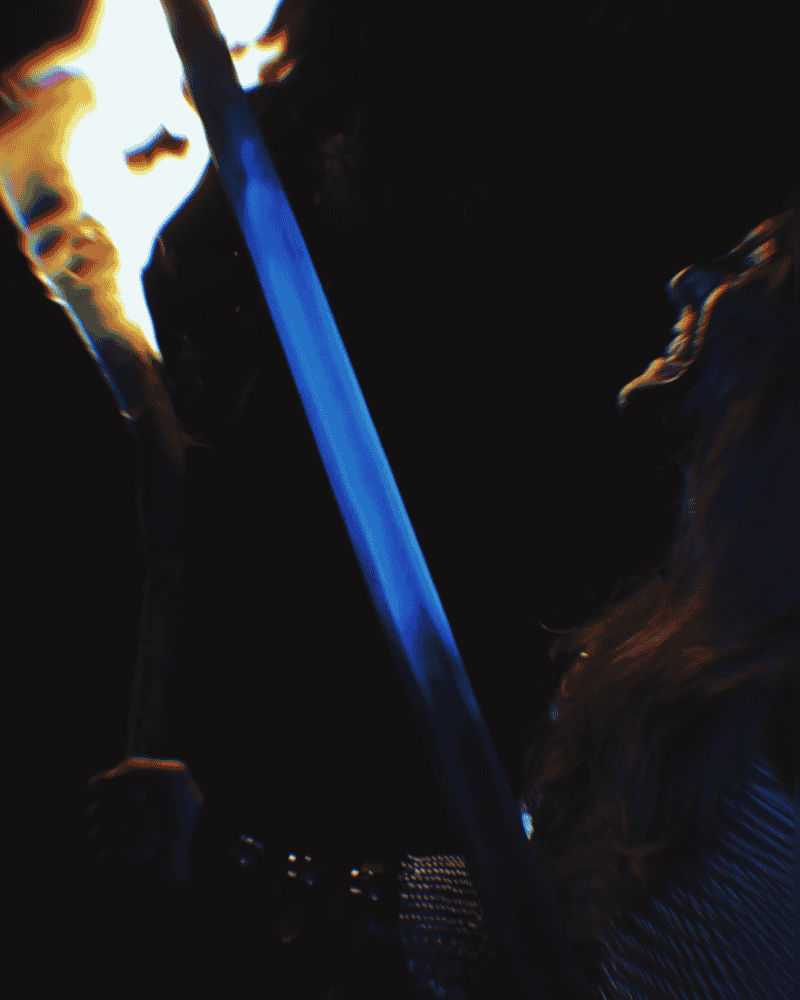
Which other folk instruments can we listen to in your album? And, why did you decide to play real instruments instead of just using programmed sounds from a computer? Wouldn’t have been this much easier for you?
Artem: A good question. Many things could be done way simpler than I did. But there is a reason behind it. No matter how diverse and high-quality modern software libraries have become, nothing can replace the experience of playing a real instrument for me. There are two main reasons for that: the first is – I want to live through the process of recording the instrument myself. Second – the uniqueness of the sound. Recording live instruments leaves a personal imprint, your own signature in the tone. The sound of the room, the way you place the microphones, how you draw the notes out and even how you breathe when playing an acoustic instrument. All of that shapes the final result.
Of course, many professional plugins (often costing a small fortune) are recorded by top producers using world-class equipment, and they deliver an amazing sound. But they weren’t created by me. For me, it’s a challenge to make it sound not only high-quality but also unique. I do sometimes use plugins – mainly for background textures – but never for the lead instruments around which I build a song.
Besides the Irish bouzouki, with a lowered and non-standard tuning inspired by Percival Schuttenbach’s tracks for The Witcher 3 soundtrack, I also have a Siberian mouth harp (vargan) and a large, handmade shaman drum crafted by a friend from my earlier musical days. You’ll hear all of them on the album alongside heavy riffs and blast beats. I think I managed to capture my original vision.
What can you tell us about your album? Are you planning to release it soon? And, what stories is it going to tell?
Artem: This is my debut long play release, and it will be titled Storm Obey No Masters! It’s a Melodic Black Metal concept album born from a place of anger and deep reflection. From the very beginning, my goal wasn’t to put together a random collection of songs – I wanted to tell a story.
It’s a dark saga set in the world of Veloria – once a land of beauty and peace, now reduced to ash by endless war and tyranny. A war whose cause has long been forgotten, lost through the generations.
Unlike the classic epic fantasy tales you often find in power metal, Storm Obey No Masters! takes you into a world without noble heroes. Through the lens of dark fantasy, I wanted to speak metaphorically about war as an endless horror, about tyranny as a curse upon all. It shows how the lust for power and victory at any cost always leads to terrible things.
And yet, I leave room for hope. There’s a thread of redemption woven into the story – a spark that refuses to be extinguished.
Fans of the melodic darkness of Dissection, the epicness of Amon Amarth, the crushing force of Bolt Thrower, the coldness of Immortal, and the mythology of Avantasia and Windir can feel like home XD
All tracks are recorded. At the moment, the last song is in the final stages of production (mixing and mastering), while the rest are ready. There will be six songs, each between five and seven minutes long, plus atmospheric transitions between some tracks. The release announcement is coming soon.
Do you count on any collaboration from other musicians in your album?
Artem: Sure thing. I took the same approach as before and asked some of my old friends to help with drum recording and album mixing. At this point, I can confidently say that Voragoth is not truly a one-man band.
I’m a strange mix – on one hand, I’m definitely an introvert. I could happily live somewhere deep in the forest. I’ve even been working from home long before the pandemic. But I deeply value collaboration with people I feel comfortable with.
It’s worth noting that both the drummer and the mixing engineer are childhood friends of mine. And the solo in Dance of Falling Stars was recorded by a friend from my school days. For me, it’s a way to share this journey with my friends, to live through a deep creative experience together.
I’ve also had help from new friends here in Croatia – with bass guitar (now actually I’ve bought it XD), and even with providing a place where I could rehearse and record for free.
Now, in order to know you a bit better, let me ask you a few more personal questions. At what age did you start playing an instrument, and what was it?
Artem: I think it started when I was around 10 or 11. I don’t remember exactly. I began taking guitar lessons, and then one day at a school concert I saw some older students playing jazz on three guitars. My jaw practically hit the floor watching what they were doing.
The very next day, I went on my own to enroll in a music school after regular classes. I just walked in and said: “I want to play like that.” I ended up studying classical guitar there for 4 years.
Were you in other bands before coming up with the idea of your project, Voragoth?
Artem: Yes, I used to play in an industrial metal band with a strong lean towards black metal. Those were my first attempts at creating something of my own, something unique. But it didn’t last long – we played some shows and only released some demos.
After that, I stepped away from music for a long time. The last 13 years of my life were dedicated to building my career, and later, to my family. I don’t regret it – I’m very good at what I do, it pays the bills, and I have a wonderful family and relationship. But still… there’s always something left inside. Not depression – though I came close to it a couple of times. It is more like an existential hunger on a metaphysical level.
By the time I started recording Dance of Falling Stars, I had been away from playing for so long that I had to, in a way, learn the guitar all over again. That track became a symbol of my personal comeback to music. And then I realized you can’t live your life waiting for the perfect moment because it may never come.
Now, at 33, I’ve returned with more passion, experience, and resources to create metal than ever before. I believe I have something to say to the world – and I damn well love doing it.
Which instrument is your favorite to play? And which are the bands/artists that have influenced you the most?
Artem: I’m afraid we could talk about this until tomorrow evening, Sílvia!
I’ve really enjoyed playing bass. Honestly, those were probably the easiest recording sessions and not because it’s “simple,” but because it was fun to play it. In Voragoth the bass has its own lines and in one song there even is a solo.
I also love playing acoustic instruments. Right now, I’m exploring the bouzouki and I’d say I’m even starting to compose new songs on it (usually I used guitar for that).
And I really enjoy singing – both clean and extreme vocals. It’s a huge field for exploration and improvement. I’ve already taken lessons with a vocal coach, and I want to continue. I plan to add more clean singing. I love Slavic and Balkan folk music, and I’d like to bring some of that into Voragoth. My range turned out to be pretty good, but to confidently hit high notes, you have to put in a lot of work. Singing also helps with extreme vocals – it builds breath control and support.
As for the bands definitely Finnish and Swedish metal: In Flames, Dark Tranquillity, Arch Enemy, Insomnium, Children of Bodom (RIP Alexi!). Then the second wave of Norwegian black metal. Here I put Immortal and Dimmu Borgir right up there among my favorites.
From my home country, there are a few artists almost unknown abroad – like Aria, classic heavy metal and then there’s Korol i Shut (Koроль и Шут), legendary Russian horror-punk icons. Their lyrics are creepy and sometimes absurd, inspired by folk tales. For example, a wanderer gets lost at night in the forest, finds a forester’s cabin, is fed… and then killed and fed to the wolves. Or a stableman invites guests, serves them meat and beer, and it turns out the meat is from his unfaithful wife, who had slept with each of them. I remember their music video was translated on TV. What a time it was!
And yes – I was listening to this between the ages of 7 and 10! It was fun, XD
I was really hooked. My mom liked them too and would buy me their CDs. I still keep them at her apartment. Their frontman died from heroin addiction – true rock ’n’ roll story. They were huge, selling out stadiums. I was too young to go to the shows – which was probably for the best, because the madness there was legendary. But they left a massive cultural imprint on my generation.
I would also mention Gogol Bordello. The band is made up entirely of immigrants, and their frontman is a man of incredible energy, originally from a land close to mine – Chernobyl. Many years later, when I became a migrant myself, their songs resonated with me even more strongly. Moreover, there are a lot of Balkan motifs in their music. Maybe it was because of their songs that, on some subconscious level, I chose Croatia XD
Once I read in your social media that you were not born in Croatia, but you moved there some time ago. Can you tell us where you were born and what brought you to your new country? How has it been the adaptation to all the new things, people, language, landscape…?
Artem: Yes, I was born and raised in Russia and half of my life in a small town on the border with Kazakhstan, and the other half in the Northern Capital, Saint Petersburg. This is a magnificent city with architecture reminiscent of Venice and Milan.
Eventually, I moved to Croatia. Circumstances simply aligned that way. On one hand, I had been considering moving abroad just to gain new life experience, to live in a different culture and climate. On the other hand, the war began – a war I don’t support (like any other war and unjustified use of force) and don’t understand, so don’t wish to take part in. I decided to keep my distance from all of that.
I had been to Croatia before, and I always liked it. But this time I wasn’t a tourist. Like any migrant, I faced bureaucracy and a period of adaptation – and honestly, that turned out to be one of the best stages of my life.
They say you need to make an effort to socialize in a new country. Well, here’s the funny part – I actually had to make an effort to stop socializing so much XD. We made friends, and with each passing day there were more of them.
Croatia is an incredible country, and I truly love it. I love the people, the culture, the language. The food and nature. Gods, it’s beautiful here. It has everything I need – the sea, the mountains. Dense, wild forests, scenic rivers, stunning islands. In many ways, because of the closeness of the languages and the similarities in culture, I don’t feel like a stranger here.
Honestly, I think this is my new home. And I want to say – I’m endlessly grateful to all my Croatian friends. If you’re reading this, know that I love you.
Do you think that moving from your country of birth has influenced your music in any way?
Artem: It was definitely a trigger. Many events including the situation my country and my people have found themselves in made me think deeply. And my thoughts led me to some very dark truths, the kind that have already been written about in books.
Not just in the simple sense like “war is darkness, death, and grief.” That seems obvious, and yet so many people took up arms as if on command. I’m not talking about those who defend themselves, but about those who attack. Where did things go wrong? Is there really a clear line between good and evil?
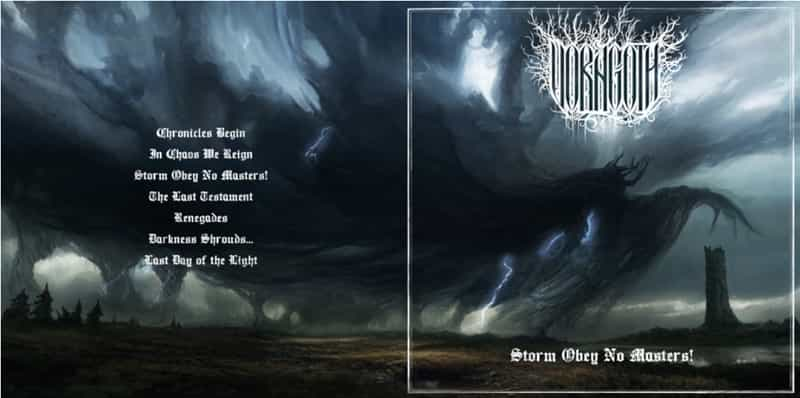
Do you think that social media is a good place to promote your music? And what do you think about streaming platforms, are they good enough to musicians, specially to the underground ones? Which platform is your favorite?
Artem: Absolutely – social media helps a lot. I’d say Instagram has become my main platform. It offers great reach and the tools to express yourself – different content formats, solid audience engagement mechanics. In many ways, Voragoth actually started as an online project.
To lay my cards on the table – Voragoth is now a band. All the members, except for the bassist (by the way, you’ve spoken to him before – Najezda), met me online first. The drummer was actually one of my very first Instagram followers. On Instagram, you also find booking managers, concert organizers, managers of other bands, label reps, and musicians from other projects — so it’s a great place to build a strong network and meet fascinating people. Of course, it doesn’t replace offline experience!
When it comes to streaming and actually growing a listener base nothing beats Spotify. Bandcamp, on the other hand, is like a storefront and a way for independent bands to make at least some income. So those are my three favorite platforms.
For finding your people, Instagram is irreplaceable. Sure, there are things to criticize but I think the developers are just focused on monetization, which is why they push the creation of junk content. Did you know that most people don’t even watch a 10-second clip until the end? At this rate, in 5–10 years the majority of people might stop focusing on anything longer than 3 seconds XD
Which band was your entrance door to Metal? Are you still listening to them, and do you enjoy listening to their music the same as before?
Artem: At first I discovered Russian bands, and when the internet came along (I was about 12 or 13), I opened the door to the Norwegian, Swedish, and Finnish bands I mentioned earlier. I still remember clearly my very first song I ever heard with harsh vocals was Norther’s cover of The Final Countdown. At first, I loved the new sound – lower, heavier, denser tone and then the scream kicked in… and I freaked out. I turned it off immediately, XD XD XD. It took some time before I started listening to melodic death metal, then moved on to classic death, and eventually to black metal.
Speaking of death metal – in Russia, in the late ’90s, there was this little-known but insanely good band called Hieronymus Bosch. I highly recommend their Artificial Emotions album. For me, it sits on the same shelf of “death metal essentials” as Heartwork by Carcass and Symbolic by Death.
Yes – the first albums I heard from CoB (Hatebreeder), In Flames (Colony, Lunar Strain), and Dark Tranquillity (SkyDancer) are still part of my regular listening diet.
As I got older, I discovered Orgy of the Righteous (Оргия Праведников) – an incredibly underrated band. Their music has been with me through a long journey, even carrying a bit of an esoteric edge. Imagine Jethro Tull, King Crimson, and early Blind Guardian wandering into a Moscow underground club, getting drunk, then sitting by a campfire in the park and deciding to play progressive folk metal with a strong theatrical twist and all while keeping acoustic guitar and flute on equal footing with electric guitars. Add to that odd time signatures, baroque complexity, and deeply serious, high-level poetry (the frontman is a published poet) – that’s how I’d describe them. If you ever get the chance, listen to For Those Who See Dreams (Для Тех Кто Видит Сны), parts one and two.
Later still, I got heavily into ’70s progressive rock, especially King Crimson, and then I discovered Dream Theater. So now I live somewhere between Freezing Moon and The Dance of Eternity.
As a listener, which genre of Metal is the most meaningful for you?
Artem: Melodic Death, Classic Heavy metal, 2nd wave black metal, progressive. These are pillars of creation! XD
Is there any song that has a special meaning to you, because it’s highly emotional?
Artem: That’s a bit harder. I listen to a lot of music, and I’ve had many life events. Plenty of songs are tied to valuable moments – good, bad, kind, sad, joyful.
Here I’ll once again name artists that few people would know unless they’re from Russia or from my social circle: Orgy of the Righteous (Оргия Праведников) – On Thin Ice (По тонкому льду), DDT – Rain (Дождь), Kino – Quiet Night (Спокойная ночь). And Bob Dylan – Knocking To Heaven’s Door.
If you take a look at the world the way it is nowadays… Do you think humanity will continue to move forward? Or, on the contrary, do you think we are condemned to self-extinction?
Artem: The longer I live, the more I realize I don’t really understand much at all. But I’ll try to reason it out. The world is vast and complex. Some things are definitely getting better: we have scientific and technological progress, medicine, the ability to cure diseases that, just a hundred years ago, could wipe out entire cities. We’ve learned so much about the universe compared to what we once believed. And overall, as Steven Pinker writes, humanity has become less bloodthirsty. We value life more than before.
But when you witness insane and terrible events right in front of your eyes, violence, war… it’s hard to believe that. It feels like the world is falling apart. So it depends on whose eyes you’re looking through and from what situation. The process isn’t linear – there may be global trends toward a brighter future, but here and now, in one place or another, there’s war, genocide, or some other horror. That’s why I don’t wear rose-colored glasses.
From a self-reflection perspective, the world would be much better if more people were inclined to it, especially those in power: politicians, corporate owners. Power is a dangerous thing. I don’t believe a bright future is possible under our current societal structure. There shouldn’t be so much power concentrated in the hands of so few. With many religions, many governments, one day we will kill each other. I think Kropotkin was right – if our species does manage to survive and reach a new stage of civilizational development, it will likely be anarchist. Without hierarchy and borders. We’re one species. Dictatorships and empires die with their leaders (just look at history since antiquity). Worshipping someone is foolish. We need more sustainable systems.
But maybe we are doomed because the lust for power is probably written into our genes.
If you had to describe the Metal community with a few words, which ones would be?
Artem: Kindness, respect, support!
What does Metal music mean to you in your life?
Artem: More than it might seem. All the most important people I’ve met in my life, I met because of metal. Metal plays a central thread in where I am now and who I am. It’s amazing. Remove Children of Bodom from that tapestry, and I wouldn’t have met my wife XD
It’s been a pleasure having you in our zine, Artem. Is there anything you want to add?
Artem: Likewise, my pleasure! Thank you for your support, and thanks to everyone who keeps supporting the metal underground scene and community! And listen to Voragoth!
Interview by Sílvia
The epic journey is about to start. Join the rebellion! Join Voragoth for a fantastic adventure and show your support if you like what you are listening to. Support the underground artists.
Band
Bandcamp
Instagram
Spotify
Youtube
**Please support the underground! It’s vital to the future of our genre.**
#WeAreBlessedAltarZine
#TheZineSupportingTheUnderground
